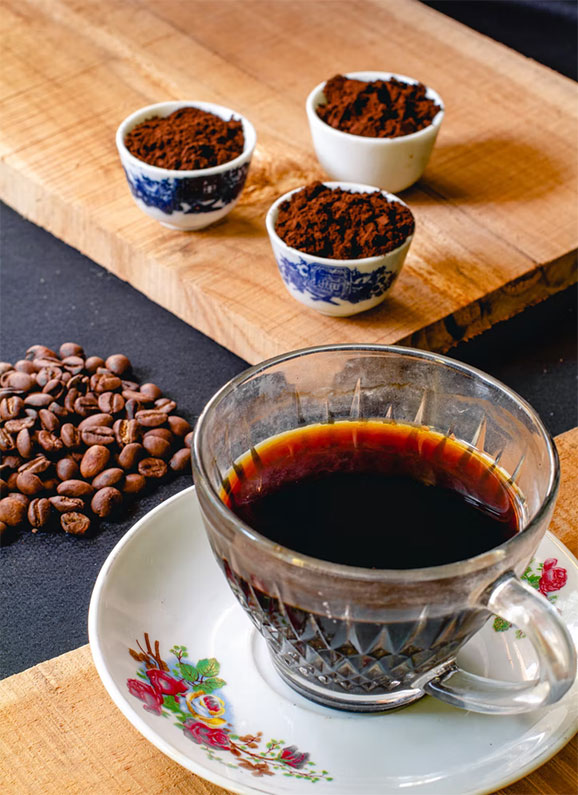Egyptian coffee, a recipe from the depths of time

From Islamic monasteries, to our cup.
Coffee in Egypt has ancient roots, as its appearance is associated with the mystical Sufi monks, who used to drink coffee during their all-night prayers. Coffee quickly lost its religious dimension, and by the end of the 17th century there were more than 600 cafes in Cairo, which were slowly becoming the centers of the city's social life - something that is still true today, even if the form of cafe has changed and of course has been modernized.
Egyptian coffee is very similar to Arabic and our Greek, since the method of preparation is similar, but it is enriched with spices, which is justified by both Egyptian gastronomy and the fact that Egypt has always been an international trade center. The coffee is boiled in water to which sugar has been added and can be arriha (sweet), mazboot (medium) or ziyada (very sweet). Sada (ie plain coffee) is traditionally consumed only at funerals - we must not forget that Egyptian coffee is quite strong and its sugar is quite suitable.
For a complete Egyptian coffee experience, it is good to prepare the blend with the traditional spices and leave it for a while, in order to mix the aromas. Then, we can prepare it traditionally, and definitely serve it with something sweet, like with a traditional Arabic syrup.
 What do we need for traditional Egyptian Coffee?
What do we need for traditional Egyptian Coffee?
- 1200 grams of very well ground coffee
- 50 grams of ground cardamom
- 25 grams of ground nutmeg
- 12 grams of ground cloves
- 5 grams of crushed mastic
- Sugar
- Water
How do we prepare the traditional Egyptian Coffee?
- Mix the coffee with the spices and leave the mixture for a few days in a closed container
- We calculate a teaspoon from our blend for each cup of coffee.
- In a saucepan, boil as much water as we will use with as much sugar as we want, depending on how sweet we want our coffee.
- Once the sugar is dissolved, withdraw (it should not have the texture of syrup, we just want a thin sugar water)
- In a large pot, put the coffee, water and stir.
- Boil on low heat
- Serve in low, small glasses as soon as it is ready
- Accompany with traditional sweets
Tips for delicious traditional Egyptian Coffee
- Definitely serve with something sweet. The flavors that match are the syrups, the nuts, the date, the flower water, but also a gentle rice pudding.
- We make sure that the grinding of our coffee is the same as the one we would have if we wanted to make Greek.
- We can skip the step of sugar water, if we are in a hurry, and put water, coffee and sugar in the kettle, as in the Greek.
- Several cafes in Egypt drip a drop of flower water into the cup. If you like its scent, try it.
- We can use ready-made, ground Greek coffee, or grind our own coffee. If we choose ready-made, we choose a mixture that has grains from Ethiopia and India.
Two purchase suggestions for Egyptian Coffee with authentic taste
Traditionally, the grains that arrived in Egypt were from Yemen in the Arabian Peninsula, but also from Ethiopia. With Yemeni coffee rare these days, we recommend a good Ethiopian single-variety coffee, but also a coffee from the shores of India, which used to carry Bedouin caravans with them.
Caffe Lab Etiopia Bona Ayele: Single-variety, 100% Arabica liquid processed coffee from Ethiopia, from the Bona Ayele farm in the Sidamo area. It is characterized by floral and fruity aromas, delicate body and sweet taste, which overflows with notes of white fruits, such as grapes and peaches, but also by lively citrus acidity.
Paradiso Caffe Beduino India Mysore AAA: Single-variety, 100% Arabica liquid processed coffee from the Mysore area, in Karnataka, India. It is characterized by pleasant floral aromas, sweet aroma and "pure", round taste. It takes its name from the fact that traditionally the best beans of Karnataka were bound by the caravans of Arab Merchants passing through the area, who had extremely high standards in their coffee.
If you want the simple, everyday coffee to become an ancient, mystical experience, the Egyptian coffee will add the mystery, the taste and the aroma you are looking for.










